
Premier Li Keqiang, together with World Bank Group (WBG) President Jim Yong Kim, International Monetary Fund (IMF) Managing Director Christine Lagarde, World Trade Organization (WTO) Director-General Roberto Azevêdo, International Labor Organization (ILO) Director-General Guy Ryder, Organization for Economic Cooperation and Development (OECD) Secretary-General Angel Gurría and Financial Stability Board (FSB) Chairman Mark Carney held the “1+6” Roundtable Meeting under the theme of “Promoting an Open, Invigorated and Inclusive World Economy” in Beijing, Sept 12, 2017. Chinese government and international organizations participating in the Roundtable (hereinafter referred to as “we”) reached the following consensus:
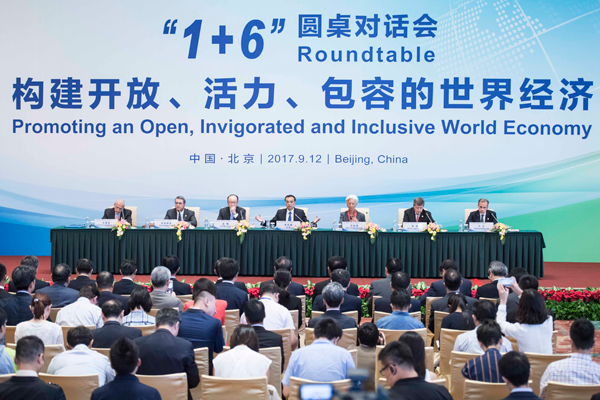
1. Macroeconomic Developments and Policies
While the world economy is picking up steam, we recognize that there are deep-seated problems, many uncertainties and destabilizing factors. Countries need to continue to use all policy tools — monetary, fiscal and structural reform policies to achieve strong, sustainable, balanced and inclusive growth. Monetary policy will continue to support economic activity and ensure price stability, consistent with central banks’ mandates. Fiscal policy will be used flexibly and be growth-friendly while ensuring debt as a share of GDP is on a sustainable path. Structural reform policies will be tailored, prioritized and sequenced based on country circumstances, with special focuses on boosting infrastructure investment, inclusiveness, innovation, entrepreneurship and job creation, so as to lift productivity and potential growth, while enhance resilience. Countries need to enhance communication and coordination in macroeconomic policies, further strengthen growth and safeguard against downside pressures.
China remains committed to the underlying principle of making progress while keeping performance stable, firmly implementing new development concepts, adapting to and steering the economic “New Normal”, and focuses on supply-side structural reforms, while moderately increasing aggregate demand and improving the expectation management. China has further implemented the innovation-driven strategy, boosted market vitality and social creativity by streamlining administration, delegating powers, strengthening regulation and improving services, and facilitated the transition to new growth engines from traditional ones by promoting mass entrepreneurship and innovation. With these efforts, China has achieved a steady and improved growth, which was not easy. In the first half of 2017, China’s GDP grew at 6.9 percent, which was within a reasonable range, major indicators outperformed forecasts, including faster growth in fiscal revenue, enterprise profits and household income, and the renminbi exchange rate maintained at a stable level. The economic structure further adjusted and improved, as manifested through greater contribution by consumption to the growth, rapid adjustment of industrial structure, ongoing and orderly reduction of excess and backward capacity. As many as 16,000 new enterprises were registered on an average day, over 13 million new urban jobs were generated annually in the past few years. The threshold for foreign investment has been reduced further, and the investment and market environment has been improved. We believe that with the supply-side structural reforms further deepened and more policy measures implemented, the Chinese economy is on track to achieve a higher quality, more efficient, more equitable, and more sustainable growth, and will continue to contribute to the global economic growth.
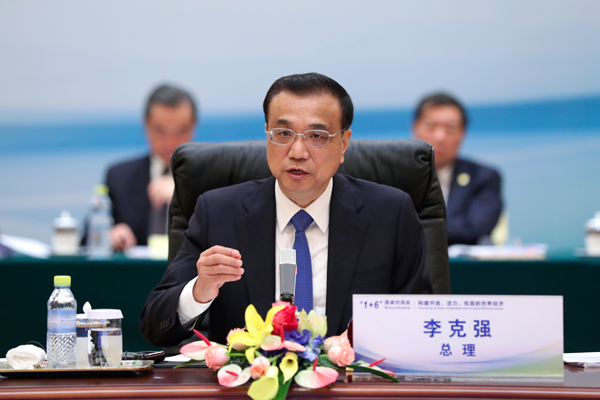
2. Economic Globalization
Globalization has provided a strong momentum to world economic growth, promoted capital and commodity flows, advanced development of technology and civilization, and built a closer tie between people worldwide. Facing both challenges and opportunities, we need to guide the direction of economic globalization and make it more invigorated, inclusive, and sustainable. In order to release greater positive effects of economic globalization, all economies need to proactively advance economic reforms, innovate the growth model, and focus on inclusiveness of development, at the mean time, to strengthen international cooperation, avoid inward-looking policies, and fight against all kinds of protectionism, so as to promote an open world economy.
China successfully hosted the Belt and Road forum for International Cooperation in Beijing this past May. Based on the principle of extensive consultation, joint efforts and shared benefits, the forum achieved fruitful results on policy consultation, infrastructure connectivity, trade promotion, financial cooperation and people-to-people exchanges, and injected new momentum to promote interconnected growth and facilitate common prosperity. The international organizations participating in the Roundtable welcome and support the Belt and Road Initiative which could help promote economic globalization, strengthen regional interconnection and deepen international cooperation, and are willing to join together with China and countries involved in the Belt and Road to push the initiative.
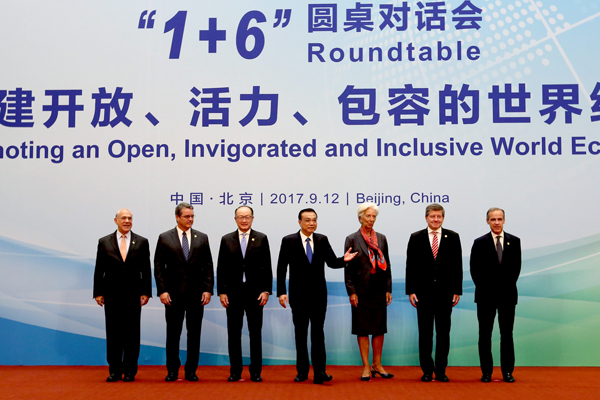
3. Sustainable Development
Implementation of the 2030 Agenda for Sustainable Development must be both inclusive and environmentally sound to reduce poverty and build shared prosperity today and for generations to come. The three pillars of sustainable development — economic, environmental, and social — carry across all sectors of development, from cities facing rapid urbanization to agriculture, infrastructure, energy development and use, water availability, and transportation. Being a shared responsibility of the international community, countries should work together to address mounting global challenges — including major infectious diseases, refugee crises, climate change and natural disasters — and provide support to developing countries.
Increasing investment in infrastructure is critical to integrate global economies, which will drive growth and help to achieve the sustainable development goals. The need for infrastructure is enormous and pressing and it will continue to grow. Filling the huge gap in infrastructure financing will require public and private financing as well as technologies and operational efficiencies. Project preparation is also critical to ensure optimal use of resources and technical soundness, as well as compliance to the appropriate social, governance and environmental protection standards. Given the importance of private financing, we welcome the MDBs’ Joint Principles and Ambitions on Crowding-In Private Finance endorsed by the G20 at the Hamburg Summit. We support the Global Infrastructure Connectivity Alliance and Global Infrastructure Facility to play their full role in enhancing infrastructure investment and experience sharing, and in jointly promoting global connectivity and economic integration.
4. Innovation
Innovation, new technologies and the digital transformation are critical new sources of growth. We welcome the continuation of work under the G20, supported by the OECD, that takes forward the G20 Blueprint on Innovative Growth and seeks to harness the potential of digitalization and innovation for inclusive growth and employment. OECD’s extensive work on analyzing and monitoring innovation policies, as reflected in the G20 Innovation Report 2016, shows that there is scope for countries to strengthen their innovation performance. Our economies and societies today are being reshaped by emerging technologies, especially those forming part of the so-called Next Production Revolution (NPR), which combines digitalization, Artificial Intelligence, the Internet of Things, bio- and nano-technologies, 3D printing and new materials’ development and application as discussed by the OECD in its report, The Next Production Revolution — A Report for G20. The NPR has the potential to transform wide segments of industry and improve overall well-being. However, these benefits go hand-in-hand with potential challenges to existing jobs and skills and the related education and training systems, as the NPR spurs structural changes in the economy. They may also test existing policy approaches to entrepreneurship and business dynamics. To harness the opportunities brought by the NPR, policymakers must support the industrial restructuring process and foster technological progress and competitiveness in industry, but also proactively facilitate social adjustment and ensure inclusion.
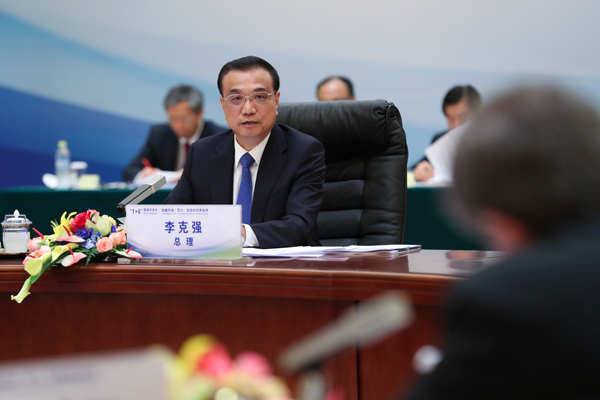
5. Structural Reform
Recognizing the essential role of structural reforms in boosting productivity and potential output as well as in promoting innovative and inclusive growth, we will promote structural reforms globally in broad areas, including removing barriers to competitive and open markets, improving tax and benefit systems including social security, implementing proactive labor market policy and boosting strategic investments in education, skills, innovation and infrastructure. G20 economies need to actively implement the G20 Enhanced Structural Reform Agenda endorsed at the G20 Hangzhou Summit. G20 members shall use the priority areas and the set of guiding principles identified in the Agenda to guide their structural reforms as well as use the set of agreed indicators to help monitor and assess progress. As noted by the OECD Technical Report on Progress on Structural Reform under the G20 Enhanced Structural Reform Agenda, the G20 has made real but still insufficient progress in structural reforms, and more efforts are warranted. In recent years, China has made good progress in facilitating rapid development of new industries, new forms of business and new models and in fastening the replacement of new growth drivers to old ones through implementation of reform measures including streamlining administration, delegating powers and improving regulation and services, starting businesses and making innovation, and structural tax reductions.
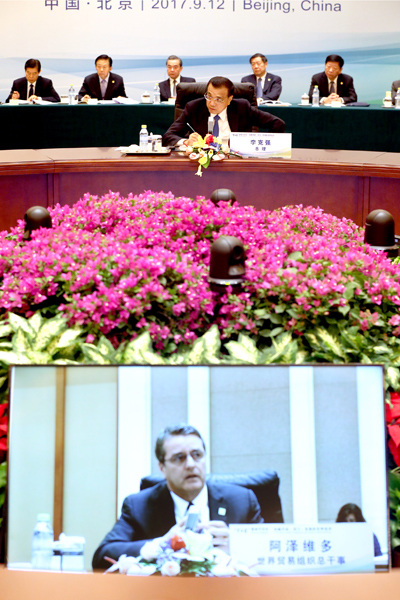
6. Trade and Investment
Trade and investment are important engines for global economic growth. Promoting further liberalization and facilitation of trade and investment globally will help respond to the development challenges faced by all, and will contribute to achieving balanced and sustainable development. The rules-based multilateral trading system represented by WTO is an integral part of global economic governance, providing an institutional framework within which its members formulate multilateral trade rules, monitor trade policy implementation and resolve trade disputes. The multilateral trading system serves as the main channel for liberalization and facilitation of global trade and investment. Regional, bilateral and plurilateral trade agreements should complement rather than substitute the multilateral trading system. Efforts should be made to ensure that such agreements are open, transparent and inclusive.
The challenges arising from trade protectionism remain a concern against the backdrop of slow global growth and the slow recovery of the world economy in recent years. We will continue to fight against all forms of protectionist measures, with a view to building a favorable environment for trade and investment among all economies. The core value and basic principle of the multilateral trading system should be strengthened. We welcome the support for the multilateral trading system by the leaders who have attended the Roundtable of the Belt and Road Forum for International Cooperation, as well as the consensus reached by BRICS countries on promoting trade and development, increasing cooperation on investment facilitation and supporting the multilateral trading system, and we also welcome China to hold International Import Expo in 2018. We call upon WTO members to accelerate their implementation of outcomes of WTO ministerial meetings in Bali and Nairobi, to advance negotiations on the remaining Doha issues, and to start the discussion in the WTO on new issues including e-commerce and investment facilitation. We support all WTO members to achieve positive outcomes at the WTO’s forthcoming 11th Ministerial Conference (MC11) in Buenos Aires.
7. Labor and Employment
A wide range of global trends including technological revolution, economic globalization, industrial restructuring and demographic shifts, especially an aging population, have had profound impacts on the world of work. These trends are creating new opportunities and challenges, and the future of work will be shaped by our coordinated well-informed policy actions. It should also be noted that poverty and unemployment remain a great challenge for the international community. Greater efforts are needed to achieve full and productive employment and inclusive growth, including gender equality. In so doing, it is essential to create more job opportunities, match labor market supply to demand, improve labor’s skills and strengthen social protection for equity and sustainability. These are key policy elements in achieving decent work, reducing poverty and inequality, and providing a better future of work for all.
The Chinese government has been implementing the Employment First Strategy and a more active employment policy, while continuing its efforts to achieve universal coverage of social insurance of its population and improving the social protection system in order to be more equitable and sustainable, and gradually establishing a reasonable income growth mechanism. With these efforts, overall employment situation in China has remained stable. Together with its social partners, the Chinese Government will continue to strengthen cooperation with the international community including the ILO, and will contribute actively to the ILO’s centenary initiative on the Future of Work.
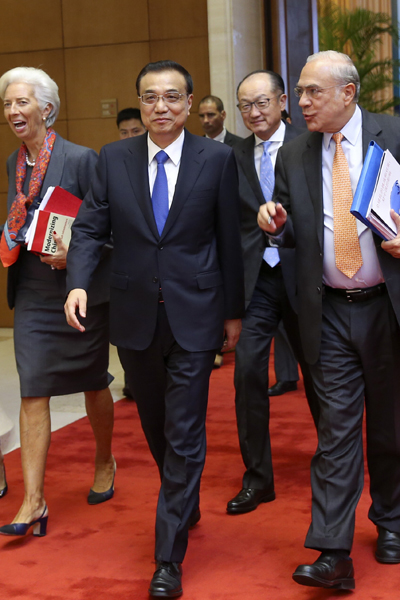
8. Financial Regulatory Reform
Despite the improved resilience of the global financial system as a result of post-crisis financial reforms, vulnerabilities still remain, and may negatively impact the strength and sustainability of global growth. China applauds and supports the FSB’s work in building a safer, simpler, fairer financial system and improving the financial regulation coordination framework. We emphasize the considerable progress made towards transforming shadow banking into resilient market based finance since the financial crisis and welcome the FSB assessment of the monitoring and policy tools available to address risks from shadow banking. We call for full, consistent and timely implementation of agreed reforms, and finalizing Basel III and other unfinished parts of the reform agenda soon, so as to foster a robust and open global financial system supporting investment, trade and growth.
Meanwhile, we must remain alert to and appropriately address new risks. Notwithstanding its great potential to facilitate financial inclusion, green finance, productivity, international integration and growth, the rapid growth of Fintech merits attention from a financial stability perspective. We fully support FSB’s efforts in identifying emerging risks and promoting international cooperation so as to unleash the potential of technological innovation in a stable and flexible way. Chinese government stands ready to strengthen cooperation with the international community including FSB, and will play a greater role in the application of digital economy and the promotion of financial inclusion and green finance.
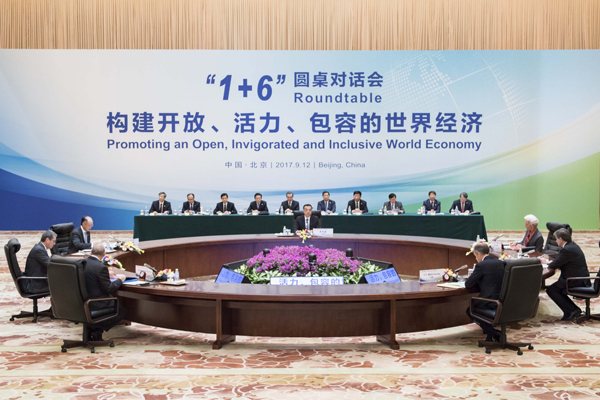
9. Global Economic Governance
We reiterate our commitment to a strong, quota-based, and adequately resourced IMF to preserve its role at the center of the Global Financial Safety Net. We support the work of the IMF to strengthen its cooperation with regional financing arrangements, and its ongoing work to further enhance the effectiveness of its lending tool kit. We look forward to the completion of the 15th General Review of IMF Quotas, including a new quota formula, by the Spring Meetings 2019 and no later than the Annual Meetings 2019. We welcome the establishment of the Joint China-IMF Capacity Development Center, and look forward to further cooperation in this area. We support the continued examination of the broader use of the SDR as a way to enhance the resilience of the international monetary system. We support the IMF’s ongoing work on improving the analysis and monitoring of capital flows and the management of related risks, including the role of macro-prudential policy.
We reiterate our commitment to a strong WBG, adequately resourced to pursue its mission to eliminate extreme poverty and boost shared prosperity in partnership with others. In this context, we support the implementation of the WBG’s shareholding review and look forward to its timely conclusion. Building on the strong shareholder confidence expressed via the record IDA18 replenishment, we also support capital increase at IBRD and IFC, aiming to enhance the financial capacities of the WBG’s public and private sector arms. This will allow the WBG to better assist countries achieve their development goals, including by helping them to maximize development resources in a responsible way, and to promote global growth, stability and security.
We agreed that this meeting was productive and sends a positive signal of jointly addressing challenges, developing a more inclusive and mutually-beneficial economic globalization, and promoting an open world economy. We look forward to holding the next roundtable meeting at an appropriate time and place next year.
